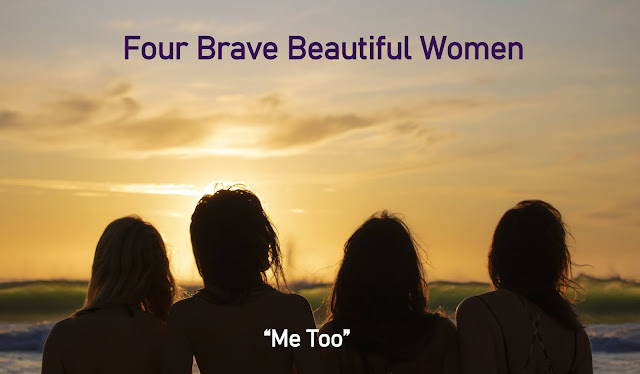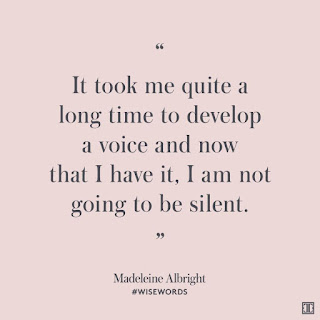"Me Too" - What Victims Want You To Know...And Do - An Update
Today, four brave beautiful women - Aly Raisman, McKayla Maroney, Simone Biles, and Maggie Nicholes, - testified before the US Senate Judiciary hearing regarding the Inspector General's report on the FBI's handling of the Larry Nassar sexual abuse investigation. These courageous elite American gymnasts stood strong as they spoke truth to power, recalling the betrayals by "powers that be" who were charged with protecting them (and hundreds of other young athletes) and who failed to do so.
The "Me Too" Movement began four years ago. Clearly, we have a long way to go. I am reposting this blog as a reminder that we must not remain silent on the issue of child sexual abuse and assault or any kind of sexual harassment against anyone.
Knowing about it is one thing. What are you willing to do?
As an advocate of victims of any kind of abuse or trauma including sexual abuse, domestic violence, bullying/cyber bullying and as a victim myself, I am encouraged by the outpouring of support. At the same time, it is important to remind ourselves how we have arrived at a place in our culture where sexual harassment and assault is pandemic, not only for females but also for males. Although I will provide you with additional readings and resources at the end of the blog, today I want to address...
What victims want you to know.
First, victims are hesitant to disclose or afraid to report their abuse or assault because they believe that they will not be believed or taken seriously.
Many times, it is a victim's word against the alleged perpetrator's word. It is a battle of "he said...she said." Depending on the role, status, or power a perpetrator holds within a family, institution, or organization, the victim's word may carry little or no weight; and in fact, it may be seen as a "threat" to the system. Therefore, many victims knowing they won't be believed or taken seriously, choose to remain quiet.
Secondly, victims are hesitant to disclose or afraid to report their abuse or assault because even if they are believed, their experience has taught them that no one will do anything about it.
In many cases because the pattern of abuse and harassment has become such a part of the culture of the system or organization, it is considered "normative" behavior. Thus, when a victim speaks up, the violation is dismissed, minimized, or ignored. In some instances, there is protocol in place to address inappropriate or illegal actions, but there is little to no effective accountability. Tragically, in environments of chronic harassment and abuse, victims who disclose or report are often blamed.
Thirdly, victims are hesitant to disclose or afraid to report their abuse or assault because they fear retaliation.
Typically, perpetrators are in a position of authority and power over the victim. Whether the violator is a parent, relative, employer, person of faith, teacher, coach, ranking officer, upper class-man, etc., the power differential itself serves a blanket of protection for the perpetrator and provides further ammunition to effectuate their abusive agendas. Out of fear for their lives, for their loved ones dependent upon them, and for their livelihoods, victims suffer in secrecy, shame, and silence.
In addition, when victims do disclose or report their abuse or assault, they risk being re-victimized and re-traumatized.
This is very important.
Whether the perpetrator is offending within a family, a college or university, a place of worship, a movie or TV production company, a branch of the military, or any institution/ organization where there is money, reputation, a brand, and/or an image at risk, that "system" will protect its own.
Let me say that again.
Whether the perpetrator is offending within a family, a college or university, a place of worship, a movie or TV production company, a branch of the military, or any institution/ organization where there is money, reputation, a brand and/or an image at risk, that "system" will protect its own.
We have witnessed this time and time again as we hear about cover-ups, pay-outs, and deals made "behind closed doors" as victims' silence is bought off. Other times, many victims courageously move through their legal course of action. As their character is scrutinized or past history is put on trial, they are re-victimized and re-traumatized in the process. To make matters more horrific, bystanders, loyal friends, or subordinates of the perpetrator often rally in support of the abuser safeguarding their own positions and protecting themselves against becoming objects of retaliation. As alliances form and solidify around the violator, victims are made out to be the "villains."
Whether the perpetrator is offending within a family, a college or university, a place of worship, a movie or TV production company, a branch of the military, or any institution/ organization where there is money, reputation, a brand, and/or an image at risk, that "system" will protect its own.
Let me say that again.
Whether the perpetrator is offending within a family, a college or university, a place of worship, a movie or TV production company, a branch of the military, or any institution/ organization where there is money, reputation, a brand and/or an image at risk, that "system" will protect its own.
We have witnessed this time and time again as we hear about cover-ups, pay-outs, and deals made "behind closed doors" as victims' silence is bought off. Other times, many victims courageously move through their legal course of action. As their character is scrutinized or past history is put on trial, they are re-victimized and re-traumatized in the process. To make matters more horrific, bystanders, loyal friends, or subordinates of the perpetrator often rally in support of the abuser safeguarding their own positions and protecting themselves against becoming objects of retaliation. As alliances form and solidify around the violator, victims are made out to be the "villains."
Understanding what victims are up against, it is critical that you know exactly what victims want you to do.
- Believe them.
- Stand with them.
- Offer to seek out help and resources with them.
- Whenever possible, intervene.
- Notify authorities you can trust.
- When you see or become aware of bullying, cyber bullying, harassment, hazing, or any kind of violence or degradation of another human being, do not remain silent. Silence is being complicit. Become a part of the solution.
Every day, brave victims are continuing to post "Me Too" on their social networking sites. Even though others are responding by "liking" and showing their support through the various emojis, that is a start. But it is not enough.
Victims need you to take action!
Additional Blogs and Resources:
Protecting Our Youth Against Campus Sexual Assault: 3 Key Strategies
Protecting Our Youth Against Campus Sexual Assault: 3 Key Strategies
Sexual Assault Thrives in the Secrecy and Silence of Closed Systems
Proactive Parenting: What Parents Need to Know and Do
Environments of Betrayal: What Victims Need To Know and Do
Domestic Violence: Peeling Away The Shame, Secrecy and Stigma
Domestic Violence: What's Worth Got To Do With It?
Proactive Parenting: What Parents Need to Know and Do
Environments of Betrayal: What Victims Need To Know and Do
Domestic Violence: Peeling Away The Shame, Secrecy and Stigma
Domestic Violence: What's Worth Got To Do With It?
For more healing tools and strategies, please visit Holli Kenley
Follow us on Twitter
Like us on Facebook - Author Holli Kenley






Comments
Post a Comment